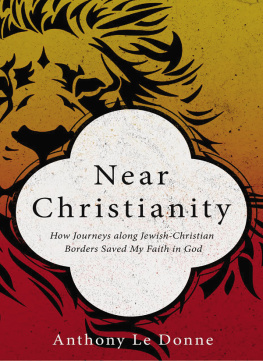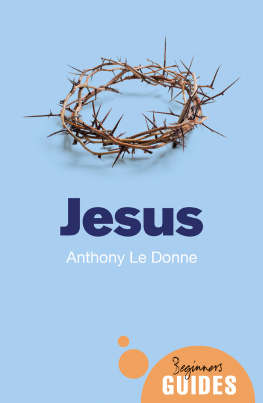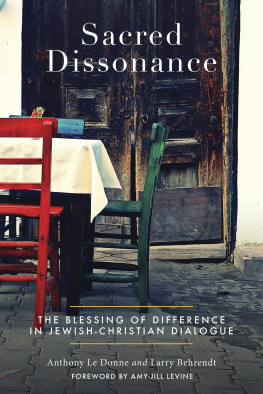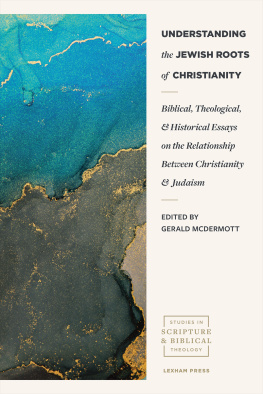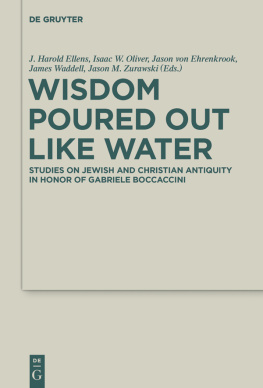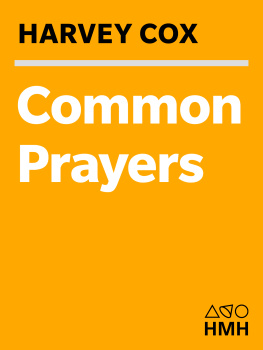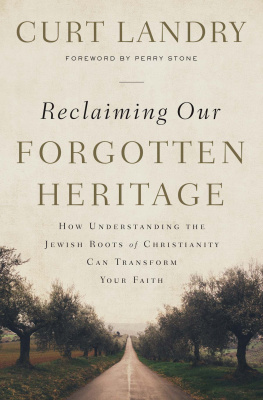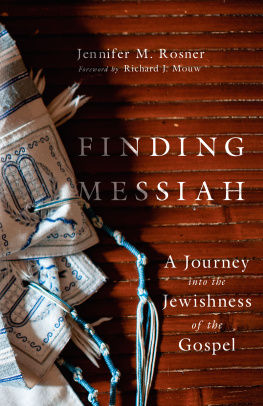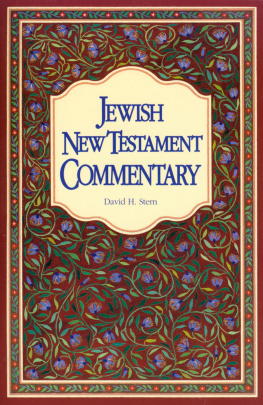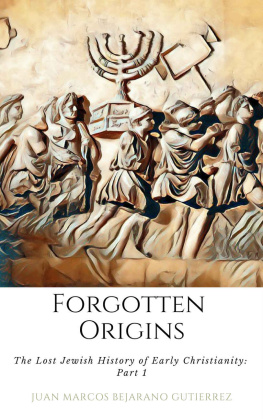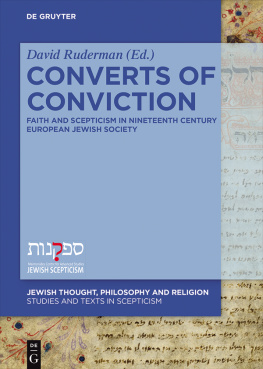
In this account of his journeys along Jewish-Christian borders, Anthony Le Donne provides a set of personal and thoughtful reflections on what is at stake in the theological, historical, and social relationships among Christians and Jews. Through anecdotes, snippets of conversation, and interaction with the work of Jewish and Christian scholars, Le Donne addresses such sensitive issues as the war on Christmas, the Holocaust, dogma, anti-Judaism and anti-semitism, and more optimistic topics such as laughter and love, belief and belonging. Le Donne shows courage by facing directly difficult questions such as the Christian role in paving the way for the Holocaust. Throughout, he shows not only respect for Jews and Judaism but tremendous understanding of Jews in the twenty-first century. He recognizes, for example, that Jewish identity does not depend on religion, faith, or observance. The book is highly readable and engaging, and will be of interest to anyone interested in a down-to-earth and honest approach to Jewish-Christian relations.
A DELE R EINHARTZ, PROFESSOR , C LASSICS AND R ELIGIOUS S TUDIES , U NIVERSITY OF O TTAWA
This extraordinary book is Jewish-Christian dialogue at its very finest. Professor Le Donne lives out what he teaches. As a Christian, he learns about God, forgiveness, faith, and love from his Jewish friends, and the wisdom he gains is to be treasured. In his allowing his friends to ask him the most difficult questions, he shows the heart of a seeker for truthultimately the heart of a teacher on fire for divine friendship made concrete in love of neighbor.
M ATTHEW L EVERING , J AMES N. AND M ARY D. P ERRY J R . C HAIR OF T HEOLOGY , M UNDELEIN S EMINARY
Writing from the borderlines of Christianity and Judaism, Le Donne offers a sympathetic, accessible, and openhearted reflection on the relationship between faith and lived reality. This book is a thoughtful, humorous, and honest response to how we should we live in the presence of neighbors and friends who are both like and unlike us. The Jewish-Christian encounters that Le Donne experiences have served to strengthen his faith; similarly, this book will both educate and enrich the reader.
D R . E D K ESSLER , W OOLF I NSTITUTE , C AMBRIDGE , UK
Argument with Judaism has featured perenniallysometimes violentlyin Christianity. Anthony Le Donne explores the stubborn facts of that conflict by means of a wideranging and reflective discussion of the cultural faultlines that have driven human communities apart. Taking his analysis into his personal experience, he shows that living with an awareness of the culture we live in can redeem us from the sin of oppressing others and stunting our own faith.
B RUCE C HILTON , B ERNARD I DDINGS B ELL P ROFESSOR OF R ELIGION , B ARD C OLLEGE
ZONDERVAN
Near Christianity
Copyright 2016 by Anthony Le Donne
Requests for information should be addressed to:
Zondervan, 3900 Sparks Dr. SE, Grand Rapids, Michigan 49546
ePub Edition August 2016: ISBN 978-0-3105-2297-3
Library of Congress Cataloging-in-Publication Data
Names: Le Donne, Anthony, 1975- author.
Title: Near Christianity : how journeys along Jewish-Christian borders saved my faith in God / Anthony Le Donne.
Description: Grand Rapids : Zondervan, 2016. | Includes bibliographical references.
Identifiers: LCCN 2016022156 | ISBN 9780310522966 (softcover)
Subjects: LCSH: Christianity and other religions--Judaism. | Judaism--Relations--Christianity.
Classification: LCC BM535 .L3483 2016 | DDC 261.2/6--dc23 LC record available at https://lccn.loc.gov/2016022156
Scripture quotations are taken from The Holy Bible, New International Version, NIV. Copyright 1973, 1978, 1984, 2011 by Biblica, Inc. Used by permission of Zondervan. All rights reserved worldwide. www.Zondervan.com. The NIV and New International Version are trademarks registered in the United States Patent and Trademark Office by Biblica, Inc.
Any Internet addresses (websites, blogs, etc.) and telephone numbers in this book are offered as a resource. They are not intended in any way to be or imply an endorsement by Zondervan, nor does Zondervan vouch for the content of these sites and numbers for the life of this book.
All rights reserved. No part of this publication may be reproduced, stored in a retrieval system, or transmitted in any form or by any meanselectronic, mechanical, photocopy, recording, or any otherexcept for brief quotations in printed reviews, without the prior permission of the publisher.
Cover design: Brian Bobel
Cover photo: iStockphoto.com
Interior design: Denise Froehlich
16 17 18 19 20 DHV 10 9 8 7 6 5 4 3 2 1
For my mother, Patricia, who first taught me about books.
HAPPY BIRTHDAY, MOM.
Contents
by Leonard Greenspoon
I n her introduction to The Misunderstood Jew, Amy-Jill Levine presents these recollections in an autobiographical mode: When I was a child, my ambition was to be pope.... I was raised in North Dartmouth, Massachusetts, a suburb of New Bedford, in a neighborhood that was predominantly Roman Catholic and Portuguese. Thus my introduction to the church was through ethnic Catholicism, and it was marvelous: feast days and festivals, pageantry and mystery, food and more food.... When I was seven, this early fascination with Christianity came to a head with two events. First, I became insistent upon making my First Communion.... Second, that year a friend on the school bus said to me, You killed our Lord. I did not, I responded with some indignation.... Yes you did, the girl insisted. Our priest said so.
I was born about a decade earlier than A.J. and 550 miles to the south, in Richmond, Virginia. I remember there being a Baptist or Methodist church on nearly every corner. None of them was more prestigious than the First Baptist Church, located at the very spot where Monument Avenue and the Boulevard met. Facing an equestrian statue of Robert E. Lee and sharing the beauty and history of the neighborhood with the Virginia Historical Society, the Daughters of the Confederacy, and the Virginia Museum of Fine Arts, this was where Richmonds movers and shakers congregated every Sunday.
I dont remember having any close school friends who attended this church or any of the other Christian congregations in town. And I dont recall that I was much concerned about it one way or the other.
All of my good friends, from grade school through high school, were Jewish. But not just that: they were members of Beth El, Richmonds conservative synagogue, most of whose familieslike minewere from Eastern Europe. What went on at Beth Ahabah, the Reform congregation with a large German Jewish contingent, was as foreign to me as the services at First Baptist Church.
Therefore, for better or worse, I lack any of the colorful first-person stories that A.J. amassed. More than that, I cant remember anyone accusing me of being a Christ killer or baiting me by calling me a Jew, dirty or otherwise. The only time I can recall my religion being a factor was when the president of the University of Richmond, the Southern Baptist institution I attended as an undergraduate, referred to me as a fine Christian gentleman. I was certain thenand remain steadfast in this view todaythat he intended this comment as a high compliment.
Without, I hope, overstating or undervaluing the importance of the life each individual lives (our autobiographies), I firmly believe that what weve seen, done, and experienced, whom weve met, how we were treated, where we livedand countless other detailsgo a long way toward defining who we are, what we value, and how we interact with others. This is as true for scholars as for anyone else. It is, I affirm, not by chance that we study what we study, teach what we teach, and structure the evaluations that we promote or deride.

